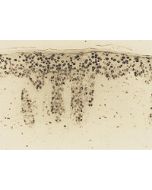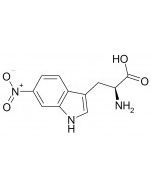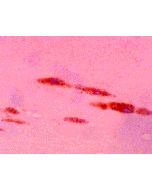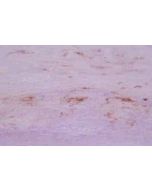Cookie Policy: This site uses cookies to improve your experience. You can find out more about our use of cookies in our Privacy Policy. By continuing to browse this site you agree to our use of cookies.
JaICA
anti-Methylglyoxal [MG], mAb (3C)
As low as
835
CHF
CHF 835.00
In stock
Only %1 left
JAI-MMG-030N30 µgCHF 835.00

Figure 1: Immunohistochemical staining of MG adducts in atherosclerotic aorta using anti-MG, mAb (3C).
| Product Details | |
|---|---|
| Product Type | Monoclonal Antibody |
| Properties | |
| Clone | 3C |
| Isotype | Mouse IgG2a |
| Immunogen/Antigen | MG-modified keyhole-lympet hemocyanine. |
| Application |
Immunohistochemistry: Recommended concentration is 0.5-1μg/mL on paraffin sections. |
| Crossreactivity |
All Human |
| Specificity |
Recognizes MG-modified proteins (especially Argpyrimidine). |
| Purity Detail | Protein A purified. |
| Formulation | Frozen liquid. Contains 10mM PBS, 0.1% NaN3 and 0.5% BSA. |
| Isotype Negative Control | |
| Other Product Data |
Click here for Original Manufacturer Product Datasheet |
| Declaration | Manufactured by JaICA. |
| Shipping and Handling | |
| Shipping | BLUE ICE |
| Short Term Storage | +4°C |
| Long Term Storage | -20°C |
| Handling Advice | Avoid freeze/thaw cycles. |
| Use/Stability | Stable for at least 3 years after receipt when stored at -20°C. |
| Documents | |
| Product Specification Sheet | |
| Datasheet |
 Download PDF Download PDF |
Description
Methylglyoxal (MG), an endogenous metabolite that increases in diabetes and is a common intermediate in the Maillard reaction (glycation), reacts with proteins and forms advanced glycation end products (AGE). MG reacts with arginine residue in protein and forms numerous numbers of adducts, such as argpyrimidine.
Product References
- Protein modification by a Maillard reaction intermediate methylglyoxal. Immunochemical detection of fluorescent 5-methylimidazolone derivatives in vivo: K. Uchida, et al.; FEBS Lett. 410, 313 (1997)
- Methylglyoxal Modification of Protein -Chemical and Immunochemical Characterization of Methylglyoxal-Arginine Adduct: T. Oya, et al.; J. Biol. Chem. 274, 18492 (1999)
- Advanced glycation and lipidoxidation of the peritoneal membrane: respective roles of serum and peritoneal fluid reactive carbonyl compounds: T. Miyata, et al.; Kidney Int. 58, 425 (2000)
- Argpyrimidine, a blue fluorophore in human lens proteins: high levels in brunescent cataractous lenses: P.S. Padayatti, et al.; Invest. Ophthalmol. Vis. Sci. 42, 1299 (2001)
- High concentrations of glucose induce synthesis of argpyrimidine in retinal endothelial cells: P.S. Padayatti, et al.; Curr. Eye Res. 23, 106 (2001)
- Curcumin Inhibits ROS Formation and Apoptosis in Methylglyoxal- Treated Human Hepatoma G2 Cells: W.-H. Chan, et al.; Ann. N.Y. Acad. Sci. 1042, 372 (2005)










![anti-4-Hydroxy-2-nonenal [4-HNE], mAb (HNEJ-2)](https://adipogen.com/media/catalog/product/cache/60eb5af712bc93baae8d55513bd31b01/j/a/jai-mhn-ihc-4-hne_stain_2.jpg)
![anti-4-Hydroxy-2-nonenal [4-HNE], mAb (HNEJ-2)](https://adipogen.com/media/catalog/product/cache/60eb5af712bc93baae8d55513bd31b01/j/a/jai-mhn-ihc-4-hne_stain.jpg)